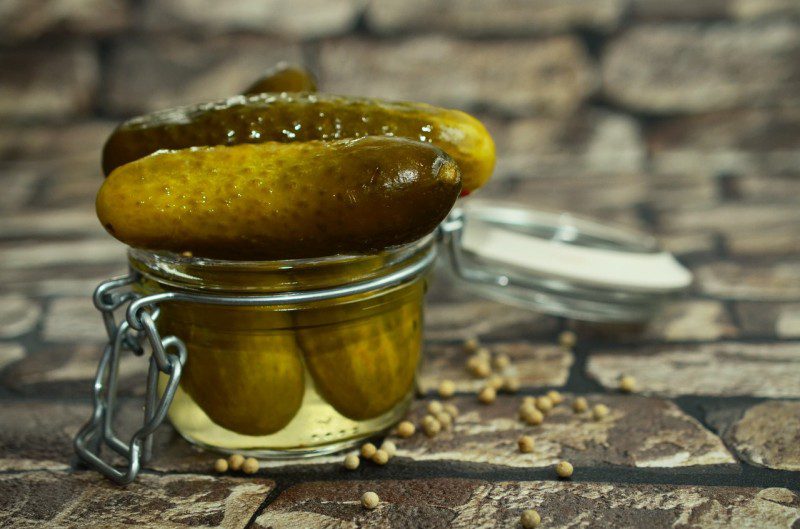
This weekend, Dearbhla Reynolds visited the IINH kitchen to introduce us to the benefits of Fermented Foods! It was an action-packed day full of cooking and tasting! Be sure to keep an eye on our cooking class page for other upcoming sessions. In the spirit of talking all things bacteria, we thought it appropriate to open up the conversation and discuss this ‘niche’ area in a bit more detail.
The Benefits of Fermented Foods
When you hear the term bacteria, it tends to set off alarm bells. In fact, we associate it with something to stay well clear of to avoid illness and infection. Despite our best efforts, overall, bacteria is quite hard to avoid since it is absolutely everywhere! And while of course, bacteria can be harmful to humans, it can also be incredibly beneficial! So how do we leverage this beneficial side and why exactly? What are the benefits of fermented foods? Read on to find out.
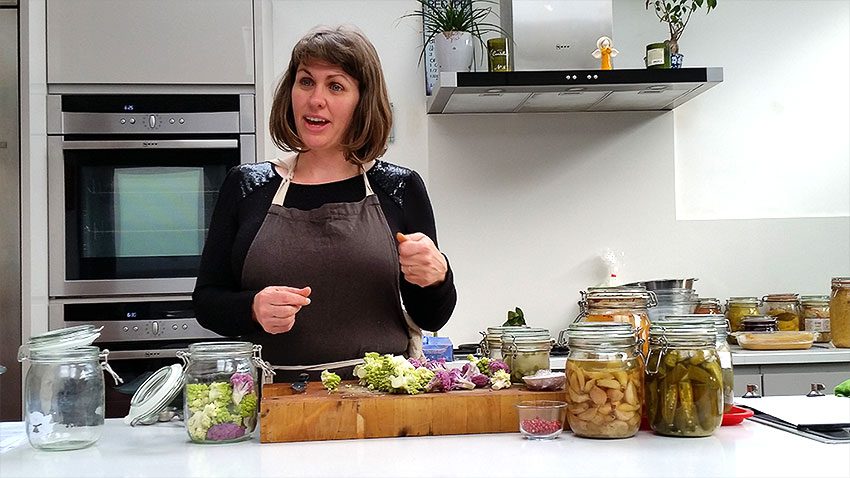
Dearbhla Reynolds – The Cultured Club
Do we need more exposure to bacteria?
Well, interestingly enough, scientists now suspect our obsession with sterilisation is not really doing us any favours! All this frequent washing ends up stripping our skin of healthy oils that actually serve as an external barrier and defence against pathogens and scientists now suspect that it has introduced a whole host of other issues, including rising levels of allergies. Collectively, this is called the hygiene hypothesis!
It’s important to understand that exposure to bacteria is not inherently a bad thing! As a species, we have evolved alongside many types of bacteria. In fact, it is thought that for every one human cell in the body, there are ten bacterial cells to go with it! This means we are outnumbered 10:1!! The good bacteria mostly resides in the gut but can also be found in other parts of the body like on the skin.
What role do bacteria play?
These microbes interact with our DNA and help us regulate our appetite, facilitate in the digestion of nutrients, control our weight, and keep our immune system running. Specifically, over 70% of our immune system is actually found in the gut so it makes sense that a healthy microbiome (or gut flora) is an important component of a healthy body. Other things our microbiome contribute to include breaking down starches (prebiotics), manufacturing vitamins (like vitamin K & the B family) and they fight against pathogens.
But there is an even more interesting fact worth noting. Our gut flora is now being referred to as the second brain! Our gut is surrounded and connected to our brain via something called the vagus nerve. This collection of nerves is called the enteric nervous system (ENS) and maintains the biochemical environment within different sections of the gut, keeping them at the correct pH and chemical composition needed for digestive enzymes to do their job. This system also has more neurons than the spinal column or central nervous system! In fact, our gut produces over 95% of serotonin and over ½ of our dopamine so there is a massive link to our mental mood! This is why scientists are now noting that people who suffer from disorders “of the mind,” like depression, obsessive-compulsive disorder, and autism, tend to also have gastrointestinal issues.
What is fermentation?
Fermentation is one of the oldest forms of food preservation in the world! In Eastern Europe, staples like borscht and sauerkraut, in Korea there is kimchi, Japan and it’s love of miso and tempeh…it’s global! The process of fermenting foods is an integral part of every tradition and culture, some more than others. At it’s basic, the process relies on little more than vegetables and salt or sugar to creates a controlled environment where bacteria grows to act as a natural preservative to prolong the life of the food. This process essentially pre-digests your food and breaks it down to a more digestible form for the body. These foods are also teeming with good bacteria that have multiple benefits for the human body.
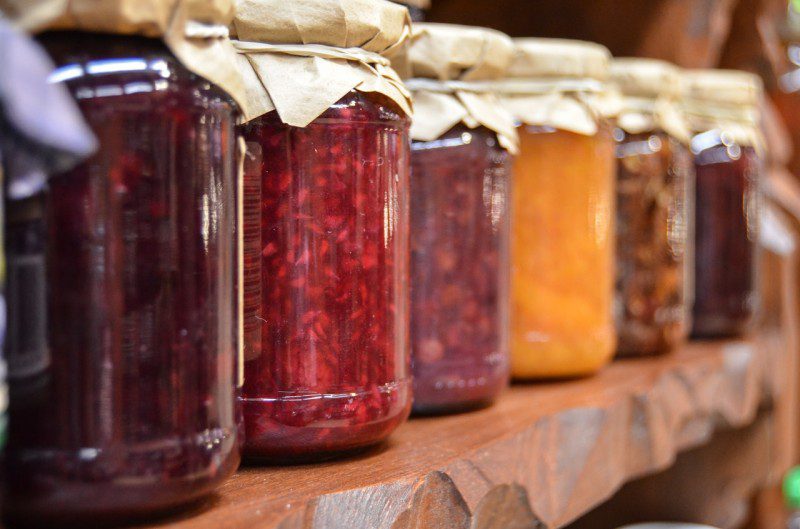
The Benefits of Fermented Foods
Aside from just preserving the food and enhancing the flavour of your meal, fermented foods carry many benefits.
- Digestive Aid: When you eat food, your body produces enzymes to help to break down the carbs, proteins and fats as they travel through your body. Fermentation creates an abundance of enzymes that contribute to both better digestion and absorption of nutrients in the gut.
- Immune system boost: 70% + of your immune system actually resides in the gut. Did you know that? It’s true! Because your digestive tract is where you take in foods and foreign bodies from outside, process them and assimilate some of the digested product into your cells, it is vitally important that there is a strong barrier in place to protect any ‘bad guys’ getting in. Eating fermented foods helps to provide some more ‘good guys’ to join the immune army! This can in turn help with reducing inflammation in the body, lessen incidences of bacterial infection and even helping to mitigate allergies and sensitivities.
- Builds gut health: You guts is a home for millions of bacteria! In fact, studies show that these bacterial cells outnumber human cells at 10:1! So the question is really about who is living on who? We have a symbiotic relationship with these bacteria, referred to as gut flora or the microbiome. Eating fermented foods helps to provide your body with free probiotics to help sustain a diverse and healthy microbiome!
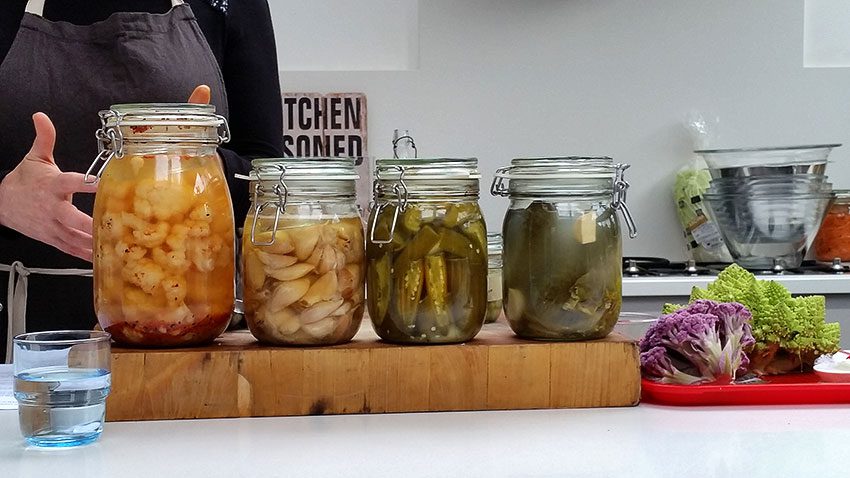
There’s More!
- Better Mood: As mentioned above, the health of your gut can contribute to your mood and has even been connected to conditions like depression. So it makes sense that if fermented foods can support the gut flora environment, it can also support a better mood, mental clarity and general feeling of wellbeing.
- Reduces sugar cravings: What do bacteria love? SUGAR! If you’ve made fermented foods before, you will know that bacteria require sugar! As the food ferments, the bacteria thrive and eat up all the sugar in the jar so fermented foods are by nature very low in sugar. Not only that but adding more beneficial bacteria to the gut helps to crowd out the sugar-loving microbes thereby reducing cravings.
Fermented Foods To Try Yourself!
If you want to get started with fermentation, we highly recommend Dearbhla’s cookbook, The Cultured Club. Below are some common fermented foods alongside some others we tried during the cooking class!
- Kefir: You’ve likely seen many variations on the market made from milk, water, coconut water.
- Kombucha: Another popular drink you will see on store shelves
- Yogurt & Cheese: These are fermented foods too, don’t forget!
- Ginger & Turmeric Bugs: A refreshing probiotic drink combining fresh ginger and turmeric!
- Brining Cauliflower
- Kimchi – a Korean staple, there are many versions you can make using kale, beetroot, carrot, cabbage and more
- Lacto-Fermented mayonnaise
- Miso marinated eggs
- Master Tonic: the ultimate immune system boost
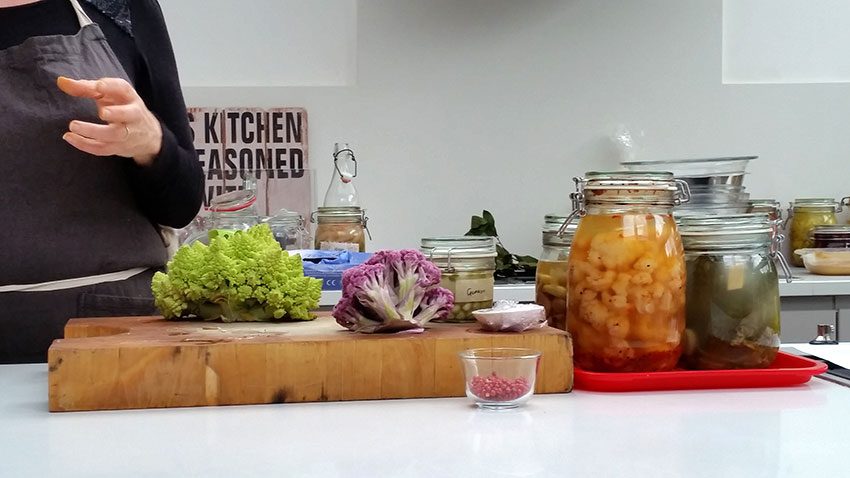
We have become so scared of bacteria and so concerned with the pathogenic kind that will make us sick. Of course, that can happen, but there are billions of bacterial strains out there! Also, the ones you can take advantage of have so much benefit to offer! We shouldn’t be intimidated by the fermenting process! The benefits of fermented foods are still an untapped resource for health and wellness. We hope this blog post encourages you to try it!
Find out more about Dearbhla & the benefits of fermented foods here: http://theculturedclub.com
Find out more about our cooking classes here: https://www.iinh.net/taste-health-cooking-classes/
